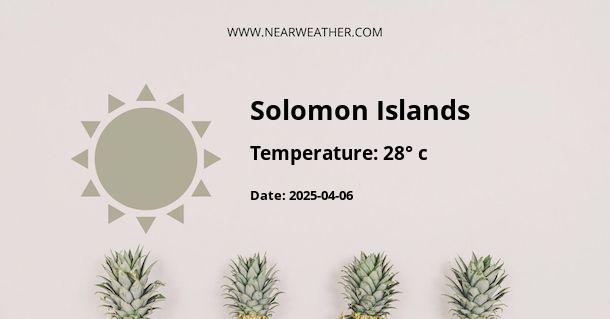Climate and Weather in the Solomon Islands
The Solomon Islands is an archipelago located in the South Pacific Ocean, northeast of Australia. It consists of 992 islands, with a diverse range of climates and weather patterns across the different islands. The climate of the Solomon Islands is primarily tropical, characterized by high temperatures, humidity, and significant rainfall throughout the year.
Temperature
The Solomon Islands experience warm temperatures year-round, with little variation between seasons. The average daytime temperature hovers around 28-32 degrees Celsius (82-90 degrees Fahrenheit), providing a consistently warm and tropical environment. The nights are also relatively warm, with temperatures rarely dropping below 20 degrees Celsius (68 degrees Fahrenheit).
It is important to note that the temperature can vary slightly depending on the specific island within the archipelago. Islands located closer to the equator tend to experience slightly higher temperatures compared to those located further away.
Rainfall
The Solomon Islands receives a significant amount of rainfall throughout the year, with no distinct dry season. The islands experience a tropical rainforest climate, characterized by abundant precipitation and high humidity levels. The average annual rainfall ranges between 2,500 and 3,000 millimeters (98-118 inches).
Rainfall patterns can vary across the different islands, with some areas experiencing heavier rainfall than others. The eastern parts of the archipelago generally receive more rainfall compared to the western regions. The wettest months are typically from November to April, coinciding with the cyclone season in the South Pacific.
Humidity
The Solomon Islands have a high level of humidity throughout the year, which is common in tropical climates. Humidity levels can range from 80% to 90%, creating a muggy and sticky atmosphere. The combination of high temperatures and humidity can make the weather feel even hotter, especially during the wet season.
Seasons
While the Solomon Islands do not have distinct seasons like temperate regions, there are two main seasons: the wet season and the dry season.
Wet Season (November to April)
The wet season in the Solomon Islands is characterized by heavy rainfall and increased humidity. This period coincides with the cyclone season in the South Pacific, which can bring strong winds and intense tropical storms. The wet season is also associated with warmer temperatures, usually peaking in January and February.
Dry Season (May to October)
The dry season in the Solomon Islands is generally less humid and experiences less rainfall compared to the wet season. However, it is important to note that the term "dry" is relative, as the archipelago still receives a significant amount of rainfall during this period. The dry season is also slightly cooler, with temperatures ranging from 25-28 degrees Celsius (77-82 degrees Fahrenheit).
Cyclones
The Solomon Islands can be affected by cyclones during the wet season. These cyclones, also known as typhoons or hurricanes, are intense tropical storms that bring heavy rain, strong winds, and potential damage to the islands. The cyclone season typically runs from November to April, with the highest risk occurring between December and March.
Best Time to Visit
The best time to visit the Solomon Islands largely depends on personal preferences and the activities you plan to engage in. If you enjoy lush green landscapes and are interested in cultural events, visiting during the wet season can be a rewarding experience. However, keep in mind the higher chance of rainfall and potential disruptions due to cyclones.
If you prefer drier weather and want to engage in water activities such as snorkeling, diving, or exploring the beaches, the dry season is generally more suitable. The months from May to October offer slightly cooler temperatures and lower humidity levels, making outdoor activities more comfortable.
Conclusion
The Solomon Islands have a tropical climate characterized by warm temperatures, high humidity, and significant rainfall throughout the year. The archipelago experiences a wet season from November to April, with heavy rainfall and increased risk of cyclones, and a dry season from May to October, which offers slightly cooler temperatures and lower humidity levels. Understanding the climate and weather patterns of the Solomon Islands can help visitors plan their trips and make the most of their experiences in this tropical paradise.
A - Solomon Islands's Latitude is -8.000000 & Longitude is 159.000000.
A - Weather in Solomon Islands is 28° today.
A - Climate Conditions in Solomon Islands shows light rain today.
A - Humidity in Solomon Islands is 76% today.
A - Wind speed in Solomon Islands is 9.32 km/h, flowing at 35° wind direction. today.
